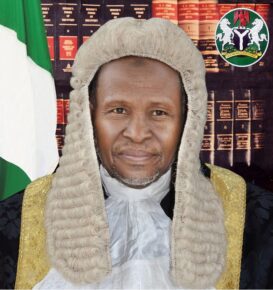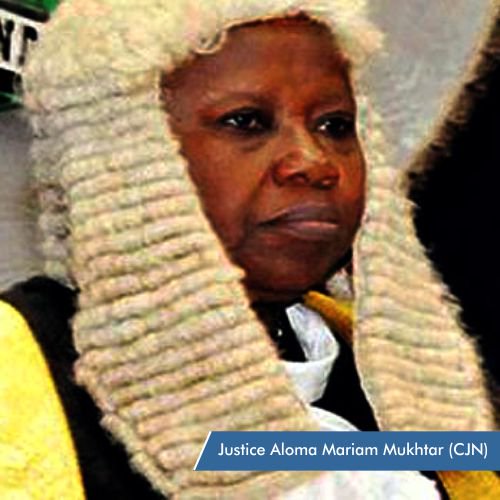On August 23, 2024, Justice Kudirat Kekere-Ekun became Nigeria’s 23rd Chief Justice of Nigeria, after her swearing-in by President Bola Tinubu at the Council Chamber of the State House, Abuja on Friday. She is the second female CJN after Justice Aloma Mariam Mukhtar and the first female CNJ from the Southwest geopolitical zone.

Below is the list of Chief Justice of Nigeria from 1914 to date
1) Sir Edwin Speed
Reign: 1914 – 1918
Note: First Chief of the Federation
2) Sir Ralph Combe
Reign: 1918 – 1929
He was a British barrister before his appointment
3) Sir Donald Kingdon
Reign: 1929 – 1946
Kingdon served with four colonial governors
4) Sir John Verity
In office: 1946 – 1954
He was a former Chief Justice of Zanzibar and British Guiana before his deployment to Nigeria
5) Sir Stafford Foster-Sutton
1955 – 1958
Stafford was the last colonial Chief of Justice of the Federation
6) Justice Adetokunbo Ademola
April 1, 1958 – 1972
He was an Egba Prince
7) Justice Taslim Olawale Elias
1972–1975
Taslim was the first Nigerian and African to become President of the International Court of Justice at The Hague. He was also the First Minister of Justice in Nigeria immediately after independence
8) Justice Darnley Arthur Alexander
1975–1979
9) Justice Atanda Fatai-Williams
1979–1983
Williams presided over the Awolowo v. Shagari case after the August 11, 1979, presidential election.
10) Justice George Sodeinde Sowemimo
1983–1985
He presided over the Treasonable Felony trial of Chief Obafemi Awolowo and twenty-six of his associates
11) Justice Ayo Gabriel lrikefe
1985–1987
Ayo was the former Attorney General of the Mid-Western State
12) Justice Muhammed Bello
1987–1995
13) Justice Muhammadu Lawal Uwais
1995–2006
He was the Chief justice of the federation during the regime of Gen. Sani Abacha (late). He served under three governments: Abacha, Abdulsalami Abubakar, and President Olusegun Obasanjo
14) Justice Salisu Modibo Alfa Belgore
2006–January 2007
15) Justice Idris Legbo Kutigi
January 30, 2007 – December 30, 2009
Kutigi was the Solicitor General and Permanent Secretary of North-Western State in 1976. He later became the Attorney General and Commissioner for Justice in Niger State
16) Justice Aloysius Iyorgyer Katsina-Alu
2009–2011
Aloysius was the Legal Officer at the Nigeria Ports Authority NPA
17) Justice Dahiru Musdapher
August 29, 2011 – July 16, 2012
Dahiru was the former Chief Judge of the Kano State
18) Justice Aloma Mariam Mukhtar
July 16, 2012 – November 20, 2014
Justice Aloma Mariam Mukhtar was the first female Chief of Nigeria and the federation. He was sworn into office as the 13th indigenous Chief Justice of Nigeria by President Goodluck Jonathan on July 16, 2012.
19) Justice Mahmud Mohammed
November 2014 – November 10, 2016
Mahmud was the former Chief judge of Taraba State
20) Justice Walter Samuel Nkanu Onnoghen
March 6, 2017 – January 25, 2019
Justice Walter Samuel Nkanu Onnoghen was the first Chief Justice of Nigeria to be suspended by Nigeria’s President. No Head of the Supreme Court witnessed such an embarrassing moment even during the dark days of the military regime in Nigeria.
Buhari suspended Justice Onnoghen on January 25, 2019, on false declaration of assets after the Code of Conduct Tribunal (CCT) made its recommendation for his suspension on January 23, 2019.
21) Justice Ibrahim Tanko Muhammad
January 25, 2019 – June 26, 2022
He was forced to resign because of allegations of financial mismanagement against him by 14 supreme court justices.
Justice Ibrahim Tanko Muhammad was said to have been forced to sign a resignation letter by the cabals at the Presidency following allegations of financial impropriety jointly signed against him by 14 Supreme Court justices, according to a follow-up story by Daily Trust Publications.
His arranged resignation was made public on Monday, June 22, 2022. He was not seen in public on the same day.
By the allegation against him, Justice Tanko Muhammad became the first Chief Justice of Nigeria who resigned because of financial mismanagement allegations against him by his fellow justices.
Technically, he became the second CJN to be ‘removed’ by the Presidency.
22) Justice Olukayode Ariwoola
June 27, 2022-August 22, 2024
He is the most controversial CJN in Nigeria’s history. From allegation of a personal relationship with the president to the accusation of appointing family relatives in the bench.
23) Justice Kudirat Kekere-Ekun
August 23, 2024-
She was sworn in by Tinubu on August 23, 2024, as 23rd CJN pending Senate confirmation.
Brief about CJN since 1914
After the amalgamation of the Southern and Northern protectorates, the first colonial Governor-General of the amalgamated colony, Sir Frederick Lord Lugard unified the laws of the two colonies.
In effect, a single Supreme, Provincial and Native court system was established and the first Chief Justice of Nigeria Sir Edwin Speed was brought from Britain, Nigeria’s colonial master.
So, Nigeria had five colonial Chief Justices of the Federation before Independence on October 1, 1960: They were: Edwin Speed, Ralph Combe, Donald Kingdon, Sir John Verity, and Stafford Foster-Sutton
From 1960 to date, Nigeria has produced 16 indigenous Chief Justices of Nigeria. The first Nigerian head of the apex court was Adetokunbo Ademola. Justice Ademola succeeded a foreigner Stafford Foster Sutton.
According to Nigeria’s Constitution, the National Judicial Council (NJC) makes recommendations to Nigeria’s president for persons for appointment to the Offices of the Chief Justice of Nigeria, the Justices of the Supreme Court and other nominations for other federal courts.
Who is the incumbent CJN?
Who was the last colonial Chief Justice of Nigeria?
Who is the longest-serving Chief Justice of Nigeria?
Before his appointment as the Chief Justice, he served as the Attorney-General of Nigeria from 1919 to 1925.
Sources:
- Featured image by @LeadwayPensure on Twitter
- National Judicial Council. “Past Chief Justices of Nigeria”. njc.gov.ng. Retrieved April 14, 2022
- Opeoluwani Ogunjimi (July 13, 2012). “Justice Aloma Mukhtar: Will a woman make a difference?”. Vanguardngr.com. Retrieved April 16, 2022
- TheCable (January 25, 2019). “Buhari suspends Onnoghen, swears in Muhammad as new CJN”. thecable.ng. Retrieved April 16, 2022

